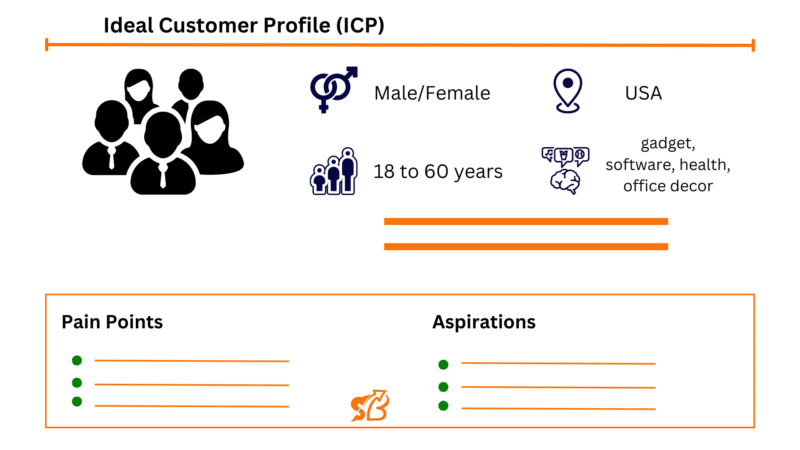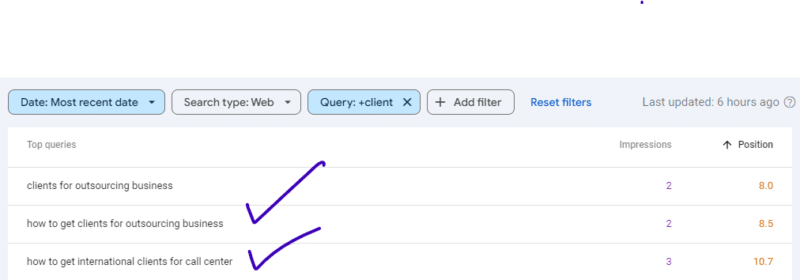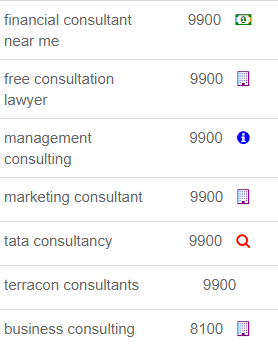If you’re seeking clients for your consulting firm, this guide is designed to be comprehensive and valuable, whether you’re just getting started or already have an established business.
It will provide you with actionable strategies to attract and retain clients, helping you grow your business and achieve your goals.
On this page
Niche down and build an ICP:
To narrow down, you should first consider what expertise you have. If you’re a solopreneur and want to start your startup, it’s much better to be specific and choose what you’re already good at.
For instance, even if you’re a business consultant, what kind of companies have you worked with? B2B, B2C, startups, corporate, fintech? The deeper you go, the better you understand, and the more targeted you can be in acquiring clients easily.
But in case you’re part of a firm with different specialists or freelance companies like Bark, then you would definitely focus on the experts you have.
Figure out what you or your company is really good at. According to a study by Edelman, 73% of B2B buyers prefer working with specialists.
For instance, when you have a discovery call with any potential client, they will ask you two questions:
- Have you worked for a company like ours?
- Have you worked recently?
Therefore, when you narrow down, you have more room to excel and prove yourself to be the best specialist in your field.
Let’s say you’re a management consultant and specialize in managing strategy for businesses.
This is good and all, but you’ll be competing with every other management consultant.
What would happen if your area of expertise was “management consultant for business-to-business (B2B) companies” instead?
That would definitely restrict who you could assist, wouldn’t it?
Well, yes and no.
Yes, since consultants who exclusively work with B2B companies are now your competitors. And no, because the number of competitors just dropped dramatically.
But you can always get more specific.
I worked with a company that only focused on branding information technology. That’s already a very specialized area, but it gets better. If someone does a search for an “information technology consultant” and this agency comes up, they’ll know right away that this is the type of person they’ve been looking for.
Once you niche down, the first step to marketing any business is developing a buyer persona. Without a buyer persona, your marketing efforts can never yield optimal results.
Here is what it looks like:

Once you have enough data about your potential clients and you have an ICP ready, you can start marketing your firm.
Run ads:
If you’re new and want to acquire clients quickly, the fastest digital marketing strategy is running paid ads.
Online ads on search engines like Google and social media platforms such as LinkedIn, X, and Reddit have a slight advantage compared to other digital marketing strategies for consultants: they are highly targeted, measurable, and yield instant results.
On the other hand, all other lead-generation strategies will take time. Therefore, consulting companies with a substantial marketing budget should always include paid ads in their digital marketing efforts, especially search ads. Search ads are inbound, where the intent is clear, allowing for better results.
The other best about ads is that you have multiple options to target your audience with demographics, interests, financial conditions, and terms they search.
It brings you right to the audiences that are pursuing your type of service, or those who might need it but aren’t aware yet.
If you focus on search engines like Google, Yahoo, and Bing, you are already targeting the search terms, ensuring that your business appears to the right audience with 100% certainty.
However, with social media advertising, it will take time to target the right person, so you may need to spend money to develop an internal Ideal Customer Profile (ICP) for each platform.
Leverage SEO:
The next big digital marketing strategy to leverage for your consulting firm is search engine optimization (SEO). Like paid search, SEO (organic search) is also an inbound marketing strategy.
In SEO, you find keywords, optimize your articles or landing pages, build links, and rank them on search engines. In return, you appear on search engines like Google and get free traffic from search engines.
For instance, I targeted two primary topics on my persona brand:
- Get clients for BPO companies
- Get clients for call center
And both of them now rank at page 1 of Google for my targeted keywords. They drive free traffic to my personal brand.

Similarly, you can also target the right keywords for your consulting firm and rank them to drive organic (free) traffic to your website.
For instance, here is how people often search on Google and find consulting firms. These are keywords with their search volume.

Let’s say you’re a business consultant or a consulting firm—you can target this keyword, and it has a decent search volume. If you want to acquire clients from search engines like Google, Bing, or Perplexity with SEO, you can check out my SEO services.
Leverage cold outreach for client acquisition:
While SEO is a powerful inbound marketing strategy, sometimes you need to take a more direct approach. That’s where cold outreach comes in.
Cold outreach is a proactive way to acquire clients by reaching out to potential prospects directly, even if they haven’t found you through search engines yet.
The key to successful cold outreach is personalization and relevance.
Here’s how consulting firms can leverage it:
- Build a targeted list: You should start by identifying potential clients based on industry, company size, or the specific services you offer. Use tools like sales navigator or business directories to compile a high-quality list.
- Craft personalized messages: Your pitch has to play its role. Generic emails won’t cut it. Personalize each message based on the prospect’s business, pain points, and aspirations and how your expertise can solve their specific problems.
- Follow-up effectively: In cold outreach, persistence is key. Don’t expect immediate results from a single email or message. Create a follow-up sequence that keeps you on their radar without being too pushy.
By combining cold outreach with your SEO efforts, you can create a well-rounded client acquisition strategy that targets both inbound and outbound channels.
Build a strong presence on Social media:
Building a presence on social media is a difficult undertaking. But it’s very valuable for consultants, as it gives them access to a large number of potential clients.
Using social media effectively involves a few steps. You would need to start by building a following by posting newsworthy content and interacting with people who could use your expertise or recommend you.
It all entails hard work but some are able to establish thousands of followers within days, while others take years to develop their audience.
Nevertheless, success will depend on the industry you’re in, the people you already know, and the quality of your posts.
The pro tip is that your potential customers aren’t going to follow if they don’t see value in what you post tutorials, tips, behind-the-scenes looks, and algorithm updates—they want content that is helpful to them.
If you only focus on promoting yourself, you probably won’t see much engagement.
Also, pay attention to trends on all of the platforms.
For example, on LinkedIn, it’s videos where people speak to a camera about their industry and expertise. And with Instagram, it’s the stories. These are things that will help reach more people if taken advantage of.
If done properly, you can expect to get leads within a month. For instance, when I started social media marketing for my persona brand, I got more than 25 DM in the first month. Here are a few examples:


Leverage video marketing:
To help secure clients, you should make videos and prove your expertise. Studies show that 86% of marketing professionals already use video as a tool. And 78% say it helps them increase sales, while the other 86% say it drives traffic through the roof.
Videos have some additional benefits; they’re more engaging and personable and rank higher on social media. Plus, you can upload them to YouTube and repurpose them as podcast episodes for extra longevity.
It all depends on how you strategize your video marketing strategy.
Podcasting:
Smart consulting firms are increasingly using podcasting to establish a relationship with their target market and integrate it into their overall marketing plan.
To begin with, podcasts give a chance to consulting companies to exhibit their knowledge and become thought leaders in their zone.
They can build credibility by providing valuable insights, knowledge, and advice to audiences. On the other hand, they can strengthen their own reputation and brand recognition, which leads to more customers and new linkages with other organizations.
Thus, if someone keeps on regularly posting valuable content through their podcasts, it is likely that they will create a community of loyal listeners who will be interested in it. This would result in more leads, conversions, and eventually revenue for the company.
Being guests on other people’s podcasts is a way for consultants to position themselves as authorities in their industry. Besides, they may also want to share what they know with more people, leading to increased leads from potential clients who may want their services.
However, when consultants interview industry experts, there is always an advantage because they might get access to such experts’ networks that can help them use social media platforms for advertising purposes.
Webinars/virtual events:
Meeting potential customers in person is priceless. You can really show your human side and respond to their questions right away. In addition, it is a wonderful marketing strategy if you offer something that they like.
One way consultants can make this happen is through live events where the kinds of people they want to work with come together.
Some consultants hold webinars so that participants can be from anywhere in the country or all over the world, while others host meetups where they live.
This can be done by bringing people together to share useful information, demonstrate their expertise, and establish relationships with potential clients.
Don’t know what topic your event should be centered on? Maybe it could focus on your field of specialization?
For instance, if you are an information technology consultant, organize a meetup for individuals desiring to find out more about fresh trends in technology.
You could present something (or ask someone else) that will prove how much information you have before opening the floor for questions, which will help people see what value such a presentation could add to their organizations’ operations.
Webinars are similar; simply get a group of people who are likely to have the same type of inquiries or interests, give out some knowledge, and let them talk at the end.
As soon as you start your event, it is not possible to have a lot of people attend it. That’s fine. It will gain traction and more people will share it after they begin seeing the value in it.
Influencer marketing:
Influencer marketing is a must for consulting firms nowadays. When you collaborate with influencers, it creates online buzz about your firm. It can also offer reputational reinforcement for your business, enhance audience participation, and increase the conversion rate.
It is so clear that influencer marketing is among the best tools for customer acquisition. This helps you generate more leads for your business and eventually earn higher revenue. Indeed, influencer marketing’s ROI can be as high as 650%.
Simply getting numerous comments and likes on your social media platform posts is hard enough! Without good engagement levels, it won’t matter if you have millions of followers. Influencer marketing comes at this point.
Firstly, partnering with influencers in making content helps improve its standard and makes it more user-friendly. You should note that such content has a higher chance of appealing to your target audience.
Secondly, sharing content by an influencer on their social media profiles will make their audience react as well. They may like the content, tag the photo with friends, or even share it on their own profile pages, thereby opening it up further.
It’s like having a friend recommend something to you. People follow and trust the thoughts of influencers who are their acquaintances. This way, companies reach a larger audience, establish credibility, and increase sales.
It is high time that the importance of influencer marketing be recognized by marketers and business owners and should be used to their advantage.
Customer reviews and portfolio:
For a company to prosper, customer feedback is key. To decide which consulting firm to hire, people will always look at the customer review, which acts as a necessary tool for those willing to consider other customers’ previous experiences in order to make an affirmative decision.
Positive reviews and testimonials serve as endorsements because they indicate that your company has helped others. This only goes to show how reliable and trustworthy your service is.
In this digital era, many people rely on customer reviews and testimonials before they can buy something.
It was reported by Statista that almost 70% of buyers read no less than six reviews before purchasing anything.
As a result, customer reviews are valuable assets for your business since people trust internet reviews from strangers more than their friends’ or relatives’ opinions.
Encourage clients to share their experiences with your company so that you can benefit from customer reviews and testimonials.
Another good idea is to display these reviews on the homepage of your website and other online platforms.
This way, potential customers can easily see them and get a feel for the value they will get.
Video testimonials are very effective because they allow prospective customers to hear directly from satisfied customers. It gives it a human feel and makes the testimonials more authentic.
Remember to engage with your clients by replying to their feedback. Thank them for taking time out of their busy lives for this great favor and addressing any issues or questions that they might have asked about.
It only shows that you cherish their views and are dedicated to offering quality services.
Conclusion:
In a nutshell, effective client acquisition for consulting firms in the digital era requires targeted advertising, SEO optimization, personalized email campaigns, engaging content marketing, a strong social media presence, impactful video content, and a professional website.
By navigating these strategies, consultants can not only attract potential clients but also establish credibility, trust, and long-term success in the competitive digital landscape.